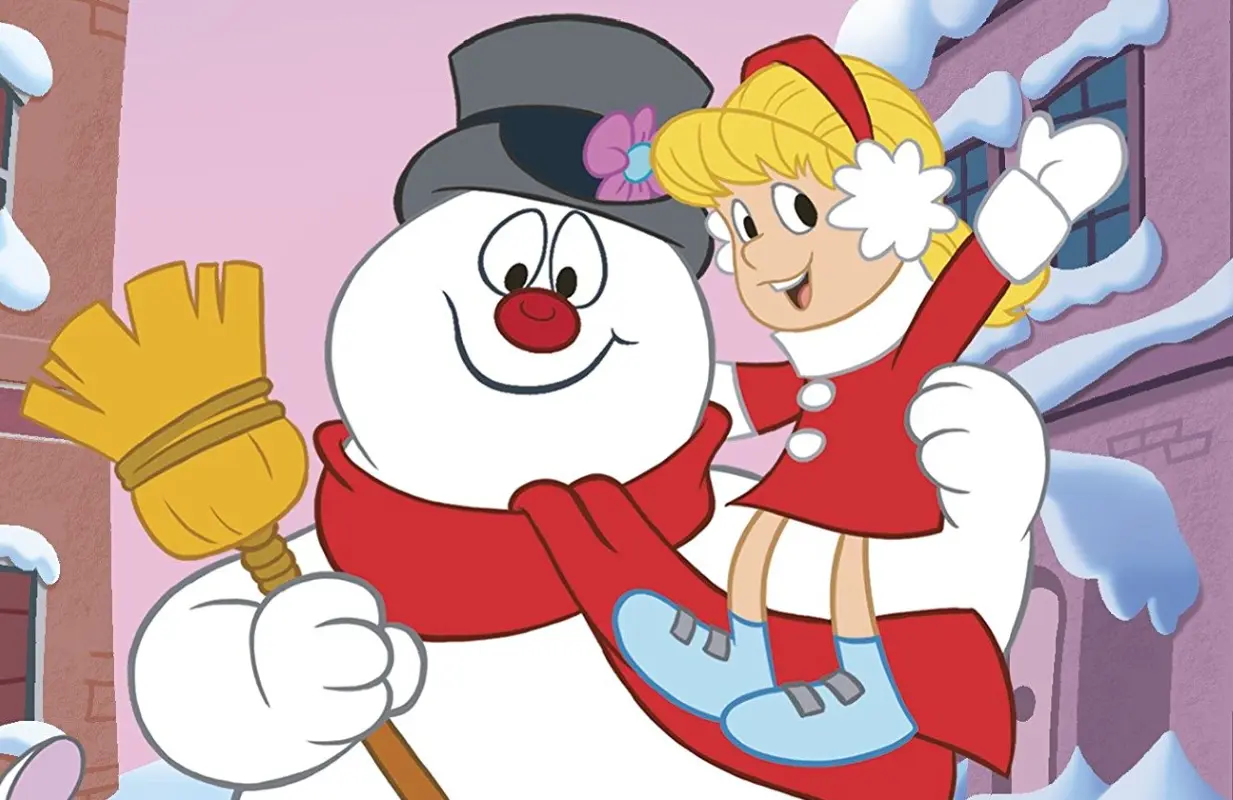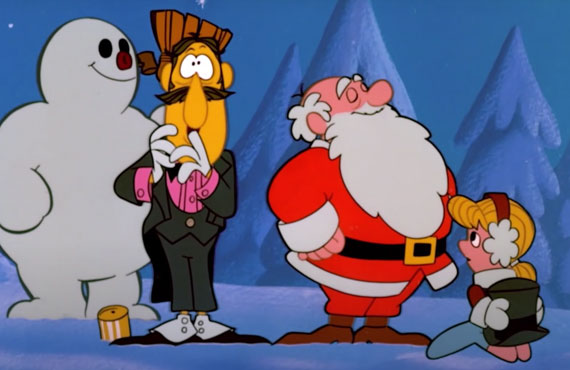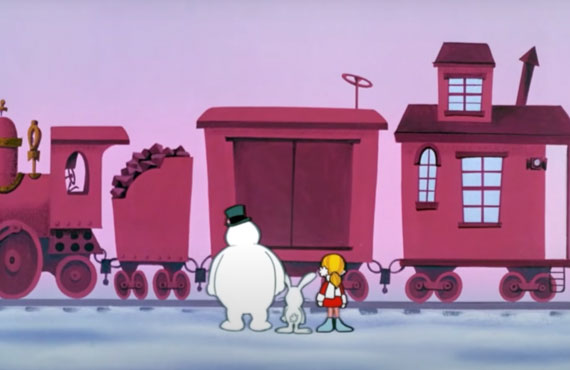Five Life Lessons Learned From Frosty the Snowman
-
 Frosty the Snowman (Rankin/Bass Productions)
Frosty the Snowman (Rankin/Bass Productions)Here's a thing you may not have realized: "Frosty the Snowman," the beloved Christmas song written by Jack Rollins and Steve Nelson in 1950, is a YOLO anthem. Listen to the lyrics. Once you get past the corncob pipe and button nose, you get to the good part: "Frosty the snowman / Knew the sun was hot that day / So he said, 'let's run / And we'll have some fun / Now before I melt away.'" Make every moment count, Frosty said! He'll sleep when he's dead! The sun is gonna burn us all up soon enough, but for now, it's time to run here and there and all around the dang square!
The 1969 animated Christmas special Frosty the Snowman, produced by the famed Christmas-special impresarios Rankin and Bass, delivers something of a different message. The song is the same, sung by the great Jimmy Durante, who also narrates, but in fleshing out the story of a snowman made human by a magic hat, that spirit of living every day as if it were your last is replaced by a series of increasingly desperate attempts to cheat death, with the title character and his cronies resorting to theft, blackmail, and breaking and entering to achieve their goals.
With the holiday season upon us, it's once again time to revisit Frosty. With that in mind, here's a roundup of the life lessons this classic special has to offer.
1. Humans and Snowmen Weren't Meant for Long Friendships

Frosty the Snowman learns this lesson the hard way. After a Christmas breeze blows Professor Hinkle's magic hat atop Frosty's head and he comes to life, he and the school children have a great time frolicking in the snow, having snowball fights, parading through town and messing with the cops, it's just great fun all around.
The problem comes when Frosty starts feeling the rise in temperature and they all decide he needs to immediately head to the North Pole, so he'll never ever melt. And so begins his odyssey north, accompanied by young Karen, who is the only one of the kids willing to hop into a refrigerated train car on Christmas Eve and travel north instead of going home to her now-terrified parents.
And thus we arrive at the problem: Karen's hometown is too warm for Frosty. The refrigerated train car is too cold for Karen. The fire that the woodland creatures build to warm Karen up is too hot for Frosty. The surrounding woods are too cold for Karen. The poinsettia greenhouse is too hot for Frosty. You get the point. Much like the lesson learned by the kid in movies like Free Willy (that killer whales aren't meant to be your pet), Karen learns the hard way that animate snowmen and human children just can't live side by side.
2. People Will Screw You Over If They Don't Like You

Okay, time to talk about Professor Hinkle, the ill-tempered magician who is called upon to do tricks for a bunch of school children — again, on Christmas Eve — only to have those children literally trample him in their rush out the door. He's finicky, he hates mess, he hates children, he's fond of the color pink. He may not be canonically gay, but I know a queer-coded villain when I see one. And as with many queer-coded villains in entertainment history, the audience is eager to see any and all bad things happen to him. Yes, he threw away his magic hat in a moment of frustration, but that didn't mean the kids could just take it. The way Jimmy Durante takes a time out at the start of act two to assure the audience that the thieving children were morally entitled to that hat is some outrageously biased storytelling.
Later on, when Santa intervenes — after, admittedly, Professor Hinkle tries to murder Frosty by locking him in a greenhouse — his punishment for Hinkle is awfully draconian. Writing out "I'm sorry for what I did to Frosty" a hundred zillion times? Blackmailing Hinkle with the threat of withholding Christmas presents to get the hat back? Boy, towns in the 1960s really had a way of communicating that your kind wasn't wanted.
3. Dress for the Weather

A brief word about Karen, whose loyalty to Frosty after knowing him for a mere hour is admirable, sure. But her self-preservation instincts are severely wanting. Boarding that refrigerated boxcar was reckless enough, but even worse isthe fact that she's dressed in a winter coat and a jumper that leaves her poor legs exposed to the elements. I'm not sure that she could have survived for too long in the North Pole anyway, but certainly not without some serious thermal leggings.
4. American Infrastructure Has Always Been a Nightmare

One easily overlooked detail in this classic holiday special comes when Karen and Frosty go looking to buy a train ticket to the North Pole, and they're quoted a price of $3,000.04. You know how your parents are always talking about how it used to cost 15 cents to go see a movie back when they were kids, and that was for a double feature with a Bug Bunny cartoon? Apparently that kind of thing wasn't happening with train travel. The outrageously steep costs when it comes to long distance rail travel are reflective of a government that's failed to invest in its own infrastructure, and one day it's gonna get a snowman melted. Let's hope that Joe Biden, the Amtrak President, makes this a priority.
5. The Northern Forests Contain Hidden Secrets

When Frosty and Karen bail on the refrigerated boxcar, they find themselves in the middle of the woods, where luckily they come upon a band of woodland creatures who are festively decorating the trees for Christmas and happily awaiting Santa's arrival. Generous sorts that they are, they offer to build Karen a fire to warm her up. There have long been many legends of the mysteries of the northern woods, where the aurora borealis shines its colors and people don't usually tread. Maybe there are also tales of mysterious greenhouses full of poinsettias, just waiting for teeth-chatteringly cold humans to come upon them in a moment of need. Seriously, where did this greenhouse come from? Who builds a greenhouse in the middle of absolutely nowhere to house their poinsettias? The costs to ship from that greenhouse must be astronomical. There's no way that's cost-efficient. Unless those woodland creatures are running a secret poinsettia business on the side, the only lesson one can glean from this crucial plot point is that the northern woods can manifest strange and helpful structures for children in need. It's as much a Christmas miracle as the idea of a Christmas breeze that brings snowmen back to life.
Frosty the Snowman airs on TV at the following dates and times this year:
- Friday, November 27, 8:00 PM — CBS
- Saturday, December 5, 8:45 PM — Freeform
- Sunday, December 6, 5:05 PM — Freeform
- Saturday, December 19, 4:55 PM — Freeform
- Sunday, December 20, 3:25 PM — Freeform
- Thursday, December 24, 8:15 PM — Freeform
- Friday, December 25, 4:30 PM — Freeform
Joe Reid is the senior writer at Primetimer and co-host of the This Had Oscar Buzz podcast. His work has appeared in Decider, NPR, HuffPost, The Atlantic, Slate, Polygon, Vanity Fair, Vulture, The A.V. Club and more.
TOPICS: Frosty the Snowman, CBS, Christmas, Holiday Programming